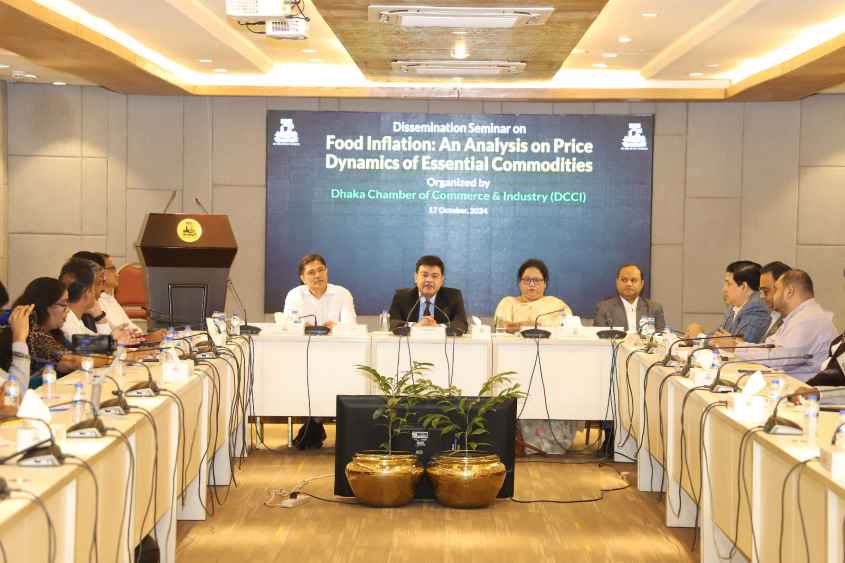Related Articles

The study found that due to increased production cost, low supply, inefficient market mechanism, high transportation cost and market dominance by wholesalers, limited bargaining power are few reasons behind commodity price hike. Few more reasons are also behind price fluctuation like artificial crisis, LC opening problem, seasonal price variation, depreciation of taka and supply chain inefficiency, inadequate storage facilities, limited market access by the producers etc.
Major reasons for current food inflation found are lack of coordination among demand, production and imports of essential products. Also, inefficient market system and information asymmetry, decrease of local production and high transportation cost, high cost of fertilizers, seeds, oils and medicines including pesticides and high input cost.
To control the inflation, the study came up with suggestions that the government should enhance data collection and dissemination to support effective decision-making, invest in better transportation networks to ensure timely delivery of food items, develop more storage facilities to reduce food spoilage and wastage and streamlining supply chain ecosystem.
DCCI President Ashraf Ahmed said despite the high price differentiate between producers and consumers, producers are not getting the reasonable price. Sometimes, indirect costs are involved in increasing prices, he said. If we can reduce the input cost in storage, transportation and processing stage, then the price may have come down. Moreover, he pointed out the wastages of perishable items is large and only processing can be a better solution for this loss. He later underscored the importance of having proper supply and demand data, data analytics and assessment for a getting a perfect policy guidelines. He also requested for a “tariff calendar” so that importers can plan import at a lower rate during off season. Overall coordination of related government agencies is crucial for a coordinated effort in this regard, he said. This was conducted as a baseline survey where across the various stages from producers, importers, wholesalers and retailers across the sample were collected, he later said.
Dr. Sayera Younus, Executive Director (Research), Bangladesh Bank said that inflation control is the most priority for Bangladesh Bank right at this moment. She also said that despite of increasing policy rate by the Bangladesh Bank in recent times, the inflation does not come down at the expected level and its main reason is non-economic factors. Not only that, few other factors like international market dynamics, exchange rate hike, increased import cost are also responsible for inflation, she added. She later said that strong monitoring is also needed to control the price fluctuation.
Saifuddin Ahmed, Joint Secretary, Trade Support Measures Wing, Ministry of Commerce said that market data analysis is crucial for having appropriate policy guidelines. We have to do research to find out the actual demand, supply capacity, what is the production capacity, what is our seasonal demand, what is the variation etc. There should be an annual statistics based on ‘product calendar’ as it will facilitate government’s taxation process of imported goods and other procedures as well, he added. Yearly we are losing 1% of our arable land and for it the overall production of agro based products is also reducing as a result our import dependency is increasing significantly, he mentioned. He also said that we need to strengthen the Competition Commission.
Md. Moshiul Alam, Joint Chief, Bangladesh Trade and Tariff Commission said that government has just recently reduced the duty on import of raw sugar. He said that we need to plan for our imports of essential items well ahead the actual need comes. He also reiterated the importance of coordination among the concerned government agencies for better functioning.
Swajan Hayder, Deputy Director, Bangladesh Bureau of Statistics said that due to gap between supply and demand sometimes causes the price hike. He also said that there should be a separate study on impact of transportation cost over price spiral. If we cannot contain the inflation, consumers have to re-adjust or sacrifice their daily expenditure with other important segments of livelihood which is also unexpected.
Razeev H. Chowdhury, Director DCCI suggested that a comprehensive research under public and private sector initiative with other stakeholders (PPP) is needed to identify the real scenario of the market dynamics. He also said that internationally the seed price gone high. Moreover electricity bill also increased a lot; that pushed the price of potato up. He also underscored the importance of a yearly import calendar.


